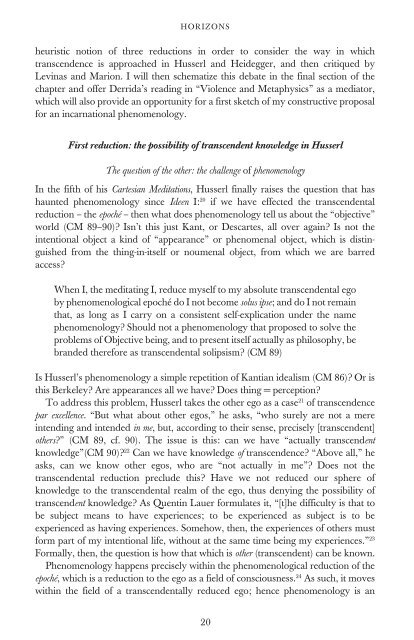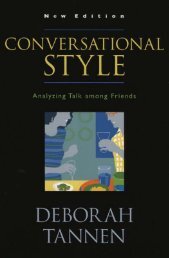Speech and Theology: Language and the Logic of Incarnation
Speech and Theology: Language and the Logic of Incarnation
Speech and Theology: Language and the Logic of Incarnation
Create successful ePaper yourself
Turn your PDF publications into a flip-book with our unique Google optimized e-Paper software.
HORIZONS<br />
heuristic notion <strong>of</strong> three reductions in order to consider <strong>the</strong> way in which<br />
transcendence is approached in Husserl <strong>and</strong> Heidegger, <strong>and</strong> <strong>the</strong>n critiqued by<br />
Levinas <strong>and</strong> Marion. I will <strong>the</strong>n schematize this debate in <strong>the</strong> final section <strong>of</strong> <strong>the</strong><br />
chapter <strong>and</strong> <strong>of</strong>fer Derrida’s reading in “Violence <strong>and</strong> Metaphysics” as a mediator,<br />
which will also provide an opportunity for a first sketch <strong>of</strong> my constructive proposal<br />
for an incarnational phenomenology.<br />
First reduction: <strong>the</strong> possibility <strong>of</strong> transcendent knowledge in Husserl<br />
The question <strong>of</strong> <strong>the</strong> o<strong>the</strong>r: <strong>the</strong> challenge <strong>of</strong> phenomenology<br />
In <strong>the</strong> fifth <strong>of</strong> his Cartesian Meditations, Husserl finally raises <strong>the</strong> question that has<br />
haunted phenomenology since Ideen I: 20 if we have effected <strong>the</strong> transcendental<br />
reduction – <strong>the</strong> epoché – <strong>the</strong>n what does phenomenology tell us about <strong>the</strong> “objective”<br />
world (CM 89–90)? Isn’t this just Kant, or Descartes, all over again? Is not <strong>the</strong><br />
intentional object a kind <strong>of</strong> “appearance” or phenomenal object, which is distinguished<br />
from <strong>the</strong> thing-in-itself or noumenal object, from which we are barred<br />
access?<br />
When I, <strong>the</strong> meditating I, reduce myself to my absolute transcendental ego<br />
by phenomenological epoché do I not become solus ipse; <strong>and</strong> do I not remain<br />
that, as long as I carry on a consistent self-explication under <strong>the</strong> name<br />
phenomenology? Should not a phenomenology that proposed to solve <strong>the</strong><br />
problems <strong>of</strong> Objective being, <strong>and</strong> to present itself actually as philosophy, be<br />
br<strong>and</strong>ed <strong>the</strong>refore as transcendental solipsism? (CM 89)<br />
Is Husserl’s phenomenology a simple repetition <strong>of</strong> Kantian idealism (CM 86)? Or is<br />
this Berkeley? Are appearances all we have? Does thing = perception?<br />
To address this problem, Husserl takes <strong>the</strong> o<strong>the</strong>r ego as a case 21 <strong>of</strong> transcendence<br />
par excellence. “But what about o<strong>the</strong>r egos,” he asks, “who surely are not a mere<br />
intending <strong>and</strong> intended in me, but, according to <strong>the</strong>ir sense, precisely [transcendent]<br />
o<strong>the</strong>rs?” (CM 89, cf. 90). The issue is this: can we have “actually transcendent<br />
knowledge”(CM 90)? 22 Can we have knowledge <strong>of</strong> transcendence? “Above all,” he<br />
asks, can we know o<strong>the</strong>r egos, who are “not actually in me”? Does not <strong>the</strong><br />
transcendental reduction preclude this? Have we not reduced our sphere <strong>of</strong><br />
knowledge to <strong>the</strong> transcendental realm <strong>of</strong> <strong>the</strong> ego, thus denying <strong>the</strong> possibility <strong>of</strong><br />
transcendent knowledge? As Quentin Lauer formulates it, “[t]he difficulty is that to<br />
be subject means to have experiences; to be experienced as subject is to be<br />
experienced as having experiences. Somehow, <strong>the</strong>n, <strong>the</strong> experiences <strong>of</strong> o<strong>the</strong>rs must<br />
form part <strong>of</strong> my intentional life, without at <strong>the</strong> same time being my experiences.” 23<br />
Formally, <strong>the</strong>n, <strong>the</strong> question is how that which is o<strong>the</strong>r (transcendent) can be known.<br />
Phenomenology happens precisely within <strong>the</strong> phenomenological reduction <strong>of</strong> <strong>the</strong><br />
epoché, which is a reduction to <strong>the</strong> ego as a field <strong>of</strong> consciousness. 24 As such, it moves<br />
within <strong>the</strong> field <strong>of</strong> a transcendentally reduced ego; hence phenomenology is an<br />
20



